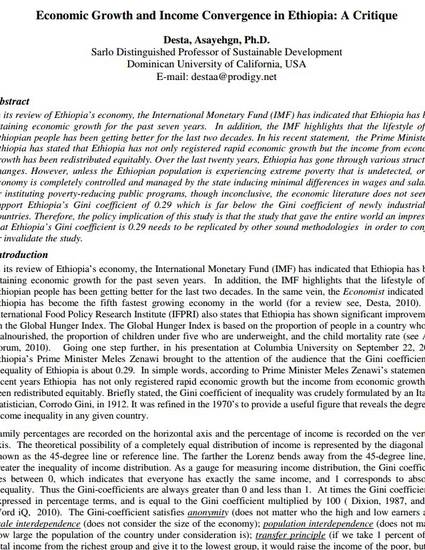
Article
Economic Growth and Income Convergence in Ethiopia: A Critique
International Journal of Business and Social Science
(2011)
Abstract
In its review of Ethiopia’s economy, the International Monetary Fund (IMF) has indicated that Ethiopia has been attaining economic growth for the past seven years. In addition, the IMF highlights that the lifestyle of the Ethiopian people has been getting better for the last two decades. In his recent statement, the Prime Minister of Ethiopia has stated that Ethiopia has not only registered rapid economic growth but the income from economic growth has been redistributed equitably. Over the last twenty years, Ethiopia has gone through various structural changes. However, unless the Ethiopian population is experiencing extreme poverty that is undetected, or the economy is completely controlled and managed by the state inducing minimal differences in wages and salaries, or instituting poverty-reducing public programs, though inconclusive, the economic literature does not seem to support Ethiopia’s Gini coefficient of 0.29 which is far below the Gini coefficient of newly industrialized countries. Therefore, the policy implication of this study is that the study that gave the entire world an impression that Ethiopia’s Gini coefficient is 0.29 needs to be replicated by other sound methodologies in order to confirm or invalidate the study.
Disciplines
Publication Date
February, 2011
Publisher Statement
Originally published as Desta, A. (2011). Economic Growth and Income Convergence in Ethiopia: A Critique. International Journal of Business and Social Science, 2(2), 25-28.
Citation Information
Asayehgn Desta. "Economic Growth and Income Convergence in Ethiopia: A Critique" International Journal of Business and Social Science Vol. 2 Iss. 2 (2011) p. 25 - 28 ISSN: 2219-1933 Available at: http://works.bepress.com/asayehgn_desta/18/
